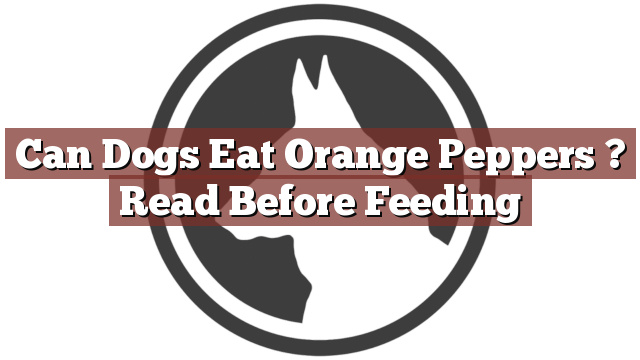Understanding Your Dog’s Dietary Needs
As responsible pet owners, it is vital to understand the dietary needs of our dogs. A well-balanced diet is essential for their overall health and wellbeing. While dogs are primarily carnivores, they can also benefit from certain fruits and vegetables that provide them with additional nutrients. However, it is crucial to remember that not all human foods are safe for our furry friends. Consulting with a veterinarian is always recommended before introducing any new foods into your dog’s diet.
Can Dogs Eat Orange Peppers? Read Before Feeding
Can dogs eat orange peppers? This is a common question among dog owners who want to expand their pet’s diet beyond traditional dog food. The answer is yes, dogs can eat orange peppers in moderation. Orange peppers contain beneficial nutrients such as vitamin C and beta-carotene, which can support your dog’s immune system and promote healthy eyesight. However, it is essential to prepare the peppers properly before feeding them to your dog.
Pros and Cons of Feeding Orange Peppers to Dogs
Feeding orange peppers to your dog has its pros and cons that should be taken into consideration. On the positive side, orange peppers are low in calories and fat, making them a healthy snack option for dogs prone to weight gain. The vitamin C content in orange peppers can boost your dog’s immune system and help fight off illnesses. Additionally, the beta-carotene found in these peppers is converted into vitamin A, which is crucial for maintaining healthy skin and coat.
On the other hand, some dogs may have difficulties digesting peppers, leading to digestive issues such as diarrhea or upset stomach. It is important to introduce orange peppers to your dog’s diet gradually and in small amounts to monitor their reaction. Remove the seeds and stems, as they can cause choking hazards or digestive blockages. Also, keep in mind that some dogs may be allergic to peppers, so it is essential to observe any allergic reactions such as itching or swelling.
Conclusion: Considerations for Feeding Orange Peppers to Your Dog
While dogs can eat orange peppers, it is important to consider the individual needs and sensitivities of your dog. Consulting with a veterinarian before introducing any new food is essential to ensure your dog’s safety and wellbeing. If your dog enjoys orange peppers and shows no adverse reactions, they can be a healthy addition to their diet. However, always feed them in moderation and monitor for any signs of digestive issues or allergies. Remember, a balanced diet and regular exercise are key to keeping your furry friend happy and healthy.
Thank you for taking the time to read through our exploration of [page_title]. As every dog lover knows, our furry friends have unique dietary needs and responses, often varying from one canine to another. This is why it's paramount to approach any changes in their diet with caution and knowledge.
Before introducing any new treats or making alterations to your dog's diet based on our insights, it's crucial to consult with a veterinarian about [page_title]. Their expertise ensures that the choices you make are well-suited to your particular pet's health and well-being.
Even seemingly harmless foods can sometimes lead to allergic reactions or digestive issues, which is why monitoring your dog after introducing any new food item is essential.
The content provided here on [page_title] is crafted with care, thorough research, and a genuine love for dogs. Nevertheless, it serves as a general guideline and should not be considered a substitute for professional veterinary advice.
Always prioritize the expert insights of your veterinarian, and remember that the health and happiness of your furry companion come first.
May your journey with your pet continue to be filled with joy, love, and safe culinary adventures. Happy reading, and even happier snacking for your canine friend!

